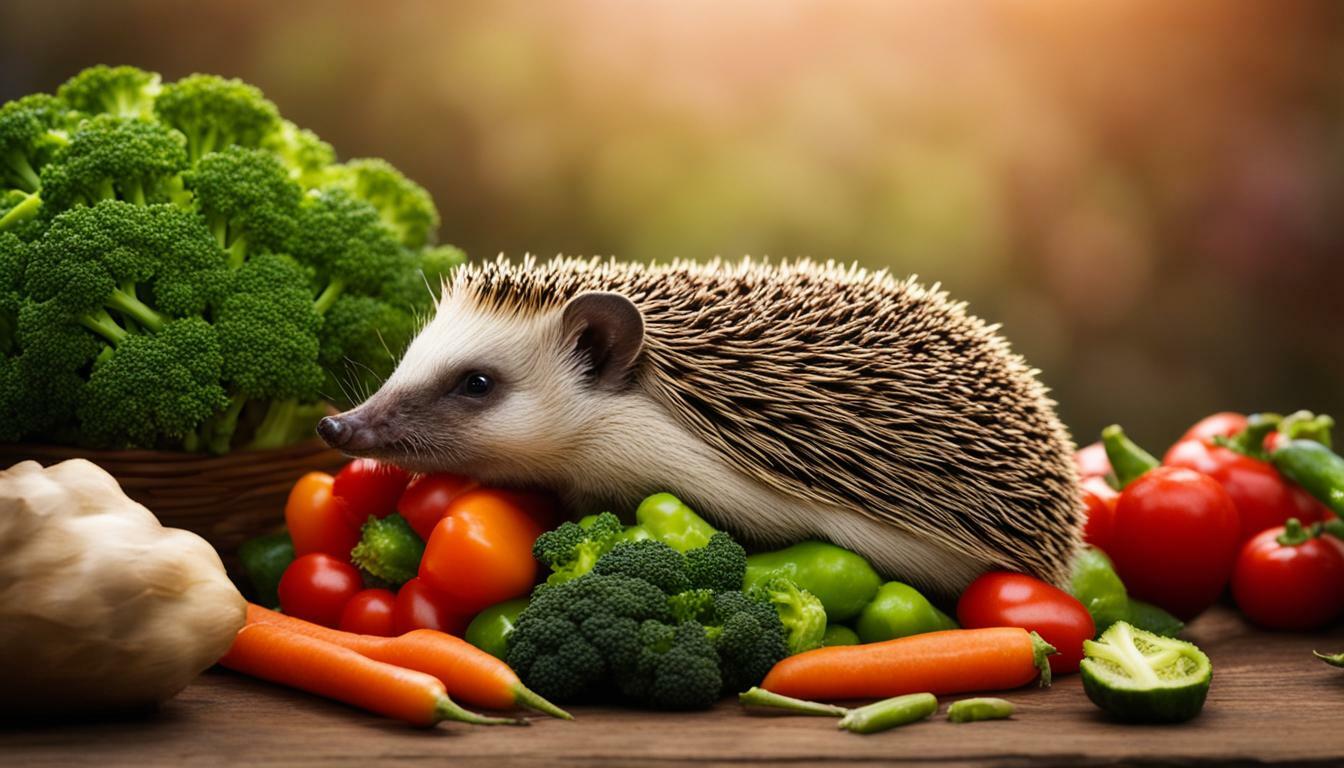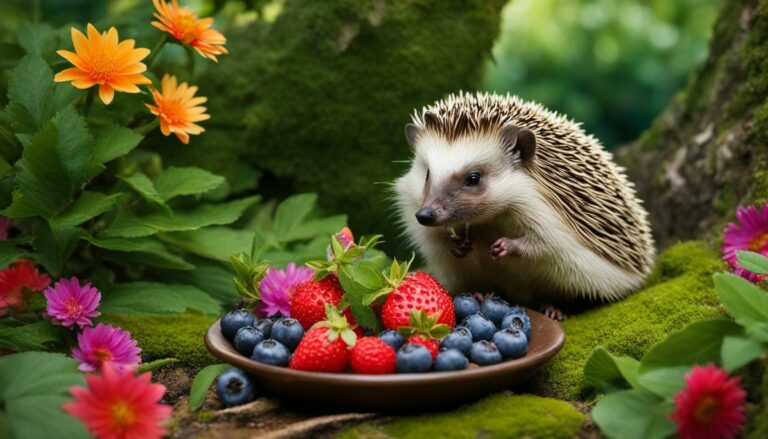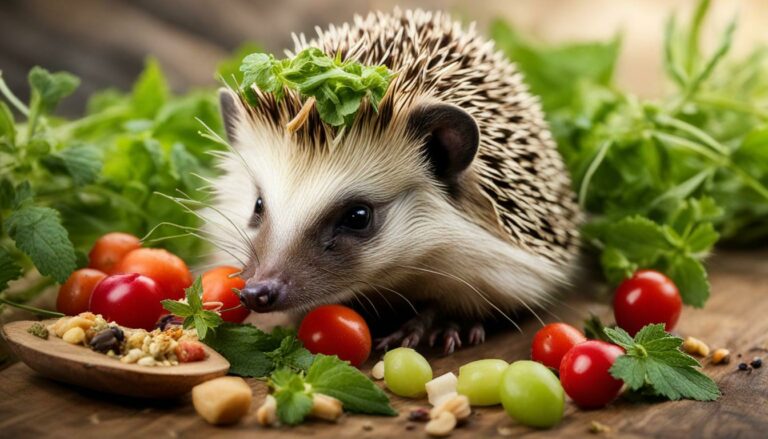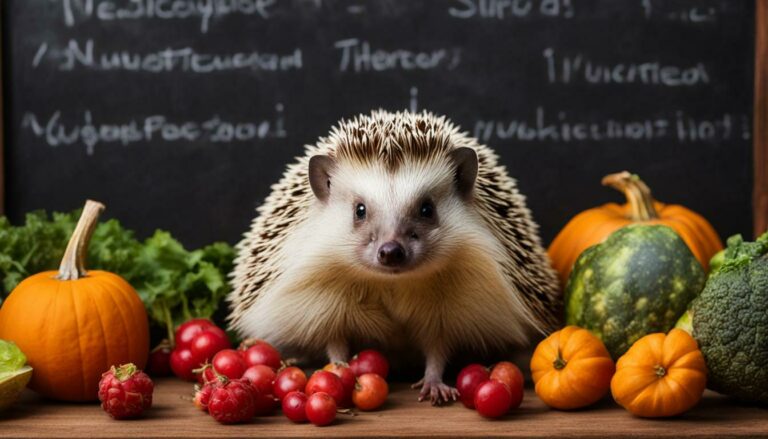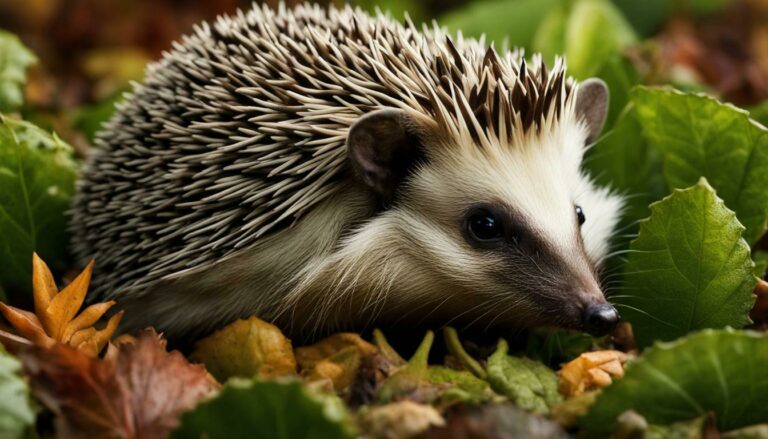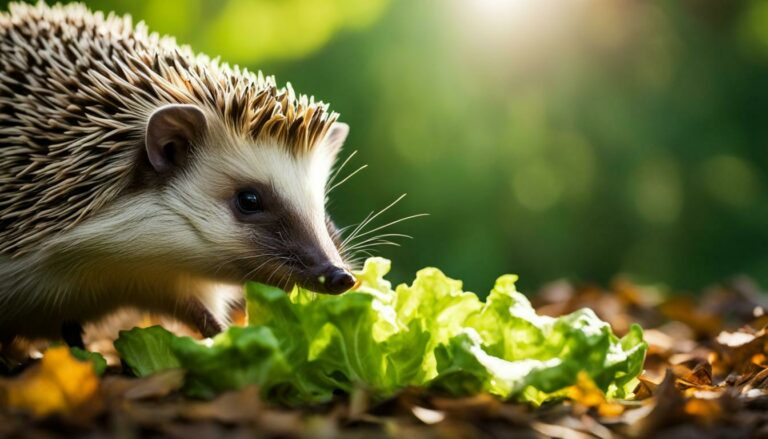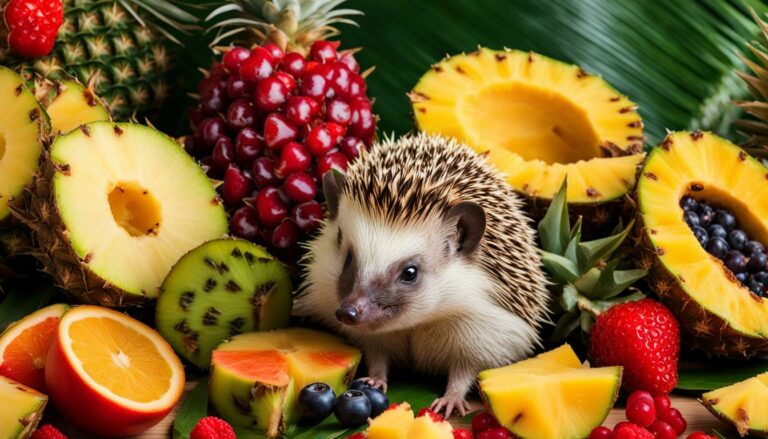Healthy Diet: Can Hedgehogs Eat Broccoli Safely?
Hedgehogs are adorable exotic creatures that many people prefer to keep as pets in the United States. As a hedgehog owner or someone considering getting one, you may be wondering if they can eat broccoli. Broccoli has a vast amount of nutrients, including iron, potassium, fiber, vitamin C, and vitamin K. While hedgehogs can eat broccoli, it’s important to feed it in moderation and prepare it properly for easy digestion. In this article, we will explore the nutritional value of broccoli for hedgehogs, provide tips on how to safely feed it to them, and discuss other safe foods and diet recommendations for these spiky little pets.
Key Takeaways:
- Hedgehogs can safely eat broccoli, which is packed with important nutrients for their health.
- Broccoli should be cut into small pieces and cooked or steamed before feeding it to hedgehogs.
- Feeding broccoli to hedgehogs should be done in moderation, as part of a balanced diet.
- There are other safe vegetables and fruits that hedgehogs can eat, but some foods should be avoided.
- Commercial hedgehog food and high-quality cat food can be alternatives to ensure a proper diet for hedgehogs.
The Nutritional Value of Broccoli for Hedgehogs
Broccoli is a nutrient-rich vegetable that is packed with vitamins and minerals, making it a potentially valuable addition to a hedgehog’s diet. This green vegetable contains significant amounts of vitamin C, vitamin K, potassium, iron, and fiber, all of which contribute to overall health and well-being for hedgehogs.
Vitamin C is essential for maintaining a strong immune system and promoting healthy growth and development. It also acts as an antioxidant, protecting cells from damage caused by free radicals. Vitamin K is crucial for blood clotting and bone health, ensuring that hedgehogs have a strong skeletal system. Potassium helps regulate fluid balance, nerve function, and muscle contractions, while iron is necessary for the production of red blood cells and oxygen transport throughout the body. Lastly, the fiber in broccoli aids in digestion and can prevent constipation in hedgehogs.
To better understand the nutritional value of broccoli for hedgehogs, the following table provides a breakdown of its key nutrients:
| Nutrient | Amount per 100g |
|---|---|
| Vitamin C | 89.2mg |
| Vitamin K | 101.6mcg |
| Potassium | 316mg |
| Iron | 0.73mg |
| Fiber | 2.6g |
It’s important to note that while broccoli offers many nutritional benefits, it should be fed to hedgehogs in moderation, alongside a balanced diet. Too much broccoli can lead to digestive issues, so it’s recommended to introduce it gradually and monitor your hedgehog’s response. Additionally, always ensure that the broccoli is cut into small, easily digestible pieces to prevent choking.
Overall, incorporating broccoli into a hedgehog’s diet can provide essential vitamins, minerals, and fiber that promote optimal health and well-being. However, it’s crucial to consult with a veterinarian or an experienced hedgehog owner for personalized dietary recommendations based on your hedgehog’s specific needs and health condition.
The Nutritional Value of Broccoli for Hedgehogs
Broccoli is a nutrient-rich vegetable that is packed with vitamins and minerals, making it a potentially valuable addition to a hedgehog’s diet. This green vegetable contains significant amounts of vitamin C, vitamin K, potassium, iron, and fiber, all of which contribute to overall health and well-being for hedgehogs.
Vitamin C is essential for maintaining a strong immune system and promoting healthy growth and development. It also acts as an antioxidant, protecting cells from damage caused by free radicals. Vitamin K is crucial for blood clotting and bone health, ensuring that hedgehogs have a strong skeletal system. Potassium helps regulate fluid balance, nerve function, and muscle contractions, while iron is necessary for the production of red blood cells and oxygen transport throughout the body. Lastly, the fiber in broccoli aids in digestion and can prevent constipation in hedgehogs.
To better understand the nutritional value of broccoli for hedgehogs, the following table provides a breakdown of its key nutrients:
| Nutrient | Amount per 100g |
|---|---|
| Vitamin C | 89.2mg |
| Vitamin K | 101.6mcg |
| Potassium | 316mg |
| Iron | 0.73mg |
| Fiber | 2.6g |
It’s important to note that while broccoli offers many nutritional benefits, it should be fed to hedgehogs in moderation, alongside a balanced diet. Too much broccoli can lead to digestive issues, so it’s recommended to introduce it gradually and monitor your hedgehog’s response. Additionally, always ensure that the broccoli is cut into small, easily digestible pieces to prevent choking.
Overall, incorporating broccoli into a hedgehog’s diet can provide essential vitamins, minerals, and fiber that promote optimal health and well-being. However, it’s crucial to consult with a veterinarian or an experienced hedgehog owner for personalized dietary recommendations based on your hedgehog’s specific needs and health condition.
How to Safely Feed Broccoli to Your Hedgehog
Hedgehogs can safely eat broccoli, but it’s crucial to know how to properly prepare and serve it to your spiky friend. Follow these guidelines to ensure that your hedgehog receives the nutritional benefits of broccoli without any potential digestive issues:
Cutting and Cooking
Before feeding broccoli to your hedgehog, make sure to cut it into small, bite-sized pieces. This will prevent choking and make it easier for your hedgehog to chew and digest. Both the stems and florets of the broccoli can be fed to your hedgehog, as they contain essential nutrients. However, it’s important to note that raw broccoli should be avoided, as it can be difficult for hedgehogs to digest.
Steaming or cooking the broccoli without any seasoning is the safest way to prepare it for your hedgehog. This helps to soften the texture and makes it more palatable for your pet. Avoid using any cooking oils or seasonings, as they can be harmful to hedgehogs.
Feeding Frequency
While broccoli is a nutritious food for hedgehogs, it should be fed in moderation. Treat broccoli as a special treat rather than a staple in your hedgehog’s diet. Introduce broccoli slowly to your hedgehog’s diet and observe how they react to it. If there are no signs of digestive problems, you can offer small, cut-up pieces of broccoli a couple of times a week.
Other Vegetable Options
While broccoli is a great addition to your hedgehog’s diet, it’s important to provide variety. Other vegetables that are safe for hedgehogs include carrots, corn, cucumbers, green peppers, turnips, sweet potatoes, arugula, spinach, and asparagus. Remember to cut these vegetables into small pieces to ensure safe consumption and easy digestion.
| Foods to Feed in Moderation | Foods to Avoid |
|---|---|
| Broccoli (small, cut-up pieces) | Grapes and Raisins |
| Carrots | Citrus Fruits (oranges, lemons, limes) |
| Corn | Avocado |
| Cucumbers | Tomatoes |
| Green Peppers | Dried Fruits |
| Turnips | Processed Meats |
| Sweet Potatoes | Milk (hedgehogs are lactose intolerant) |
| Arugula | Bait Shop Insects (may contain pesticides and parasites) |
| Spinach | |
| Asparagus |
By following these guidelines, you can safely incorporate broccoli into your hedgehog’s diet and ensure they receive a well-rounded and nutritious meal. Remember to always monitor your hedgehog’s response to new foods and consult a veterinarian if you have any concerns about their diet or health.
Moderation and Frequency of Broccoli Feeding
While hedgehogs can enjoy broccoli as part of their diet, it’s vital to feed it in moderation and pay attention to their digestive response. Broccoli provides valuable nutrients like vitamin C, vitamin K, fiber, potassium, and iron, which contribute to their overall health. However, excessive consumption can lead to digestive issues, so it’s important to establish a balanced feeding routine.
When introducing broccoli to your hedgehog’s diet, start with small amounts and observe their reaction. If they tolerate it well and show no signs of discomfort or digestive problems, you can gradually increase the quantity. It’s recommended to offer broccoli as a treat a couple of times a week, alongside other vegetables and a well-balanced diet.
To ensure safe consumption, always cut broccoli into small, bite-sized pieces. This not only prevents choking hazards but also aids in digestion. Hedgehogs have small mouths, and large pieces can be difficult for them to chew and swallow. By cutting it into smaller portions, you make it easier for them to enjoy their meal without any complications.
| Foods to Avoid for Hedgehogs | Reasons to Avoid |
|---|---|
| Grapes and Raisins | Potential liver failure |
| Citrus Fruits | Acidity and digestion issues |
| Avocado | Toxicity and high fat content |
| Tomatoes | Acidity and digestive discomfort |
| Dried Fruits | Choking hazard and high sugar content |
| Processed Meats | Obesity and preservatives/additives |
It’s also important to note the foods that should be avoided for hedgehogs. Grapes and raisins can cause liver failure, while citrus fruits such as oranges, lemons, and limes are too acidic for their sensitive digestive systems. Avocado should be avoided due to its toxicity and high fat content.
Tomatoes can cause digestive discomfort due to their acidity, and dried fruits are not recommended due to the risk of choking and high sugar content. Processed meats, like those that contain preservatives and additives, should also be avoided as they can contribute to obesity due to their high-fat content.
By feeding your hedgehog a balanced diet that includes variety and moderation, you can ensure their nutritional needs are met while promoting their overall health and well-being. Always consult with a veterinarian knowledgeable about hedgehog care to address any specific dietary concerns or questions you may have.
Foods to Avoid for Hedgehogs
While hedgehogs have a diverse diet, there are certain foods that should be avoided to prevent harm to your spiky friend. Some foods can be toxic or cause digestive discomfort for hedgehogs, so it’s important to be aware of what not to feed them. Here are some foods to avoid:
- Grapes and Raisins: These fruits are highly toxic to hedgehogs and can cause liver failure. It’s best to keep them away from your hedgehog at all times.
- Citrus Fruits: Oranges, lemons, and limes are too acidic for hedgehogs’ digestive systems and can cause discomfort. It’s best to avoid feeding them these fruits.
- Avocado: This fruit is toxic to hedgehogs and can also contribute to obesity due to its high fat content. Avoid giving your hedgehog any avocado.
- Tomatoes: Tomatoes are acidic and can cause digestive discomfort for hedgehogs. It’s best to steer clear of tomatoes when feeding your pet.
- Dried Fruits: Dried fruits are high in sugar and can be a choking hazard for hedgehogs. It’s best to avoid giving them dried fruits to ensure their safety.
- Processed Meats: Processed meats, such as hot dogs or sausages, contain preservatives and additives that can be harmful to hedgehogs. These meats are high in fat and can contribute to obesity. It’s best to stick to lean protein options instead.
Along with these specific foods, there are a few other items that hedgehogs should avoid:
- Milk: Hedgehogs are lactose intolerant, so milk and other dairy products can cause digestive issues. Stick to water as their primary source of hydration.
- Bait Shop Insects: Insects from bait shops may contain pesticides and parasites, making them unsafe for hedgehogs. It’s best to get insects from a reputable pet store that specializes in hedgehog care.
While some of these foods may seem harmless to us, they can have adverse effects on hedgehogs. It’s crucial to provide a safe and suitable diet for your hedgehog’s overall health and well-being.
| Foods to Avoid | Reason |
|---|---|
| Grapes and Raisins | Highly toxic, can cause liver failure |
| Citrus Fruits | Too acidic for hedgehogs’ digestive systems |
| Avocado | Toxic and high in fat content |
| Tomatoes | Acidic, can cause digestive discomfort |
| Dried Fruits | High in sugar, choking hazard |
| Processed Meats | Contain preservatives, additives, and high fat content |
Other Vegetables and Fruits for Hedgehogs
In addition to broccoli, there are several other vegetables and fruits that can be included in a hedgehog’s diet to provide a range of nutrients. It’s important to offer a varied diet to ensure your hedgehog gets all the necessary vitamins and minerals for optimal health.
Vegetables:
| Vegetable | Benefits |
|---|---|
| Carrots | Rich in vitamin A and fiber, good for dental health |
| Corn | Provides energy and contains antioxidants |
| Cucumbers | Hydrating and low in calories |
| Green peppers | A good source of vitamin C and antioxidants |
| Turnips | High in fiber and vitamin C |
| Sweet potatoes | Excellent source of vitamin A and fiber |
| Arugula | Packed with vitamins A, C, and K, and calcium |
| Spinach | Rich in iron and other essential nutrients |
| Asparagus | Contains folate and is a good source of fiber |
Fruits:
- Apples: Rich in vitamin C and fiber
- Strawberries: High in antioxidants and vitamin C
- Blueberries: Packed with antioxidants and vitamins
- Bananas: Good source of potassium and vitamin B6
- Melons: Hydrating and contain vitamins A and C
- Kiwi: Rich in vitamin C and fiber
- Peaches: Provide vitamins A and C, and fiber
- Pineapple: Contains bromelain, a natural enzyme that aids digestion
When feeding vegetables and fruits to your hedgehog, always remember to cut them into small, manageable pieces. This will ensure safe consumption and easy digestion. It’s also important to offer a balanced diet and avoid overfeeding. Moderation is key to maintaining your hedgehog’s health.
A Note on Commercial Hedgehog Food
While it’s important to include fresh vegetables and fruits in your hedgehog’s diet, commercial hedgehog food can also be a valuable part of their nutrition. Look for high-quality hedgehog food that is specifically formulated to meet their dietary needs. These foods often contain a balance of proteins, vitamins, and minerals tailored to support hedgehog health. Just be sure to read the label and choose a brand that does not contain any artificial flavors or additives. If commercial hedgehog food is not readily available, high-quality cat food can be an alternative option, but it should never be the sole source of nutrition for your hedgehog.
In conclusion, offering a variety of vegetables and fruits alongside a balanced diet of commercial hedgehog food or high-quality cat food can ensure your hedgehog receives the necessary nutrients for a happy and healthy life.
| Fruit | Benefits |
|---|---|
| Apples | Rich in vitamin C and fiber |
| Strawberries | High in antioxidants and vitamin C |
| Blueberries | Packed with antioxidants and vitamins |
| Bananas | Good source of potassium and vitamin B6 |
| Melons | Hydrating and contain vitamins A and C |
| Kiwi | Rich in vitamin C and fiber |
| Peaches | Provide vitamins A and C, and fiber |
| Pineapple | Contains bromelain, a natural enzyme that aids digestion |
The Best Diet for Hedgehogs
Hedgehogs are omnivores with specific dietary needs, and the best diet for them includes a combination of carefully selected commercial hedgehog food and other nutritious options. It’s important to provide a balanced and varied diet to ensure their overall health and well-being.
Commercial hedgehog food, such as Mazuri Hedgehog Diet, is an excellent choice as it is specially formulated to meet their nutritional needs. This food is rich in fiber and protein, and it contains essential vitamins and minerals like vitamin E and omega-3 fatty acids. It’s important to choose a high-quality brand that does not contain artificial flavors or unhealthy additives.
In addition to commercial hedgehog food, you can also incorporate other foods into their diet. Vegetables like carrots, corn, cucumbers, green peppers, turnips, sweet potatoes, arugula, spinach, and asparagus can be given as occasional treats. It’s important to cut these vegetables into small pieces to make them easier for hedgehogs to chew and digest.
When it comes to fruits, it’s best to feed them in moderation due to their high sugar content. Fruits like apples, strawberries, blueberries, bananas, melons, kiwi, peaches, and pineapples can be offered as occasional snacks. Again, cut them into small pieces to prevent choking hazards and monitor the quantity to avoid excessive sugar intake.
| Foods to Include | Foods to Avoid |
|---|---|
| Commercial hedgehog food (e.g., Mazuri Hedgehog Diet) | Grapes and raisins |
| Carrots, corn, cucumbers, green peppers, turnips, sweet potatoes, arugula, spinach, asparagus | Citrus fruits (oranges, lemons, limes) |
| Apples, strawberries, blueberries, bananas, melons, kiwi, peaches, pineapples | Avocado |
| Chicken, tuna, salmon (cooked, without seasonings) | Tomatoes |
It’s important to avoid certain foods that are toxic or harmful to hedgehogs. Grapes and raisins can cause liver failure, citrus fruits are too acidic for their digestive system, and avocados are toxic and fatty. Tomatoes can cause digestive discomfort, dried fruits are choking hazards, and processed meats contain unhealthy preservatives and additives.
Avoid feeding hedgehogs milk or cream as they are lactose intolerant. Bait shop insects should be avoided due to potential pesticide contamination and parasites. While hedgehogs can eat small amounts of meat, it should be cooked and without seasonings. Moderation is key when feeding meat to hedgehogs to maintain a balanced diet.
The Importance of a Balanced Diet
Providing a balanced diet is crucial for the overall health and well-being of hedgehogs. A well-rounded diet ensures they receive the necessary nutrients, vitamins, and minerals to support their growth, immune system, and overall bodily functions.
Feeding hedgehogs a variety of foods not only keeps them interested in their meals but also helps prevent nutritional deficiencies. It’s important to monitor their weight and adjust their food intake accordingly to prevent obesity or undernourishment.
Remember to always provide fresh water for your hedgehog and clean their food dishes regularly. Consult with a veterinarian specializing in exotic pets to get specific dietary recommendations based on your hedgehog’s individual needs and any existing health conditions.
In conclusion, the best diet for hedgehogs includes a combination of commercially available hedgehog food and carefully selected fruits, vegetables, and meats. It’s important to provide a balanced and varied diet to ensure their nutrition and overall well-being. Remember to feed in moderation, cut food into small pieces, and avoid toxic or harmful foods. By providing a healthy and nutritious diet, you can help your hedgehog live a happy and fulfilling life.
Conclusion
In conclusion, hedgehogs can safely enjoy broccoli as part of their diet, along with a variety of other vegetables and fruits, to maintain a balanced and nutritious eating plan. Broccoli provides essential vitamins and minerals, such as vitamin C, iron, and potassium, which contribute to a hedgehog’s overall health and well-being. It can be served steamed or cooked, and both the stems and florets can be included in their meals. However, it is important to cut the broccoli into small, digestible pieces to prevent choking and aid in proper digestion.
While broccoli is a safe and healthy food option for hedgehogs, it should be fed in moderation. It is best to introduce broccoli slowly into their diet and monitor their digestion to ensure they tolerate it well. Feeding broccoli a couple of times a week, in small portions, is recommended to prevent digestive problems and maintain a well-balanced diet.
It is important to note that while hedgehogs can enjoy broccoli, there are certain foods that should be avoided. Grapes, raisins, citrus fruits, avocados, tomatoes, dried fruits, and processed meats are toxic or harmful to hedgehogs and should not be included in their diet. It is also crucial to avoid feeding hedgehogs dairy products, bait shop insects, and excessive amounts of meat.
In addition to broccoli, hedgehogs can enjoy a range of other vegetables and fruits, such as carrots, corn, cucumbers, green peppers, turnips, sweet potatoes, arugula, spinach, apples, strawberries, blueberries, bananas, melons, kiwi, peaches, and pineapple. These options provide variety and help ensure a diverse nutritional intake for hedgehogs.
Overall, by offering a balanced diet that includes broccoli and other suitable foods, hedgehog owners can provide their pets with the necessary nutrients for optimal health and happiness. It is recommended to consult with a veterinarian or a qualified expert to get individualized advice on the best diet for your specific hedgehog.
FAQ
Q: Can hedgehogs eat broccoli?
A: Yes, hedgehogs can eat broccoli. It is a safe and nutritious food for them.
Q: How should I feed broccoli to my hedgehog?
A: It is best to cut broccoli into small pieces before feeding it to your hedgehog. You can cook or steam the broccoli, but avoid giving it raw. The stems can also be eaten.
Q: How often can I feed broccoli to my hedgehog?
A: Broccoli should be fed to hedgehogs in moderation, as a treat. It is recommended to give it a couple of times a week, in small, cut-up pieces.
Q: What other foods should hedgehogs avoid?
A: Hedgehogs should avoid grapes, raisins, citrus fruits, avocado, tomatoes, dried fruits, processed meats, and milk. These foods can be toxic or cause digestive discomfort for hedgehogs.
Q: What other vegetables and fruits can hedgehogs eat?
A: Hedgehogs can enjoy a variety of vegetables, including carrots, corn, cucumbers, green peppers, turnips, sweet potatoes, arugula, spinach, and asparagus. They can also eat fruits such as apples, strawberries, blueberries, bananas, melons, kiwi, peaches, and pineapple. These should be fed in moderation.
Q: What is the best diet for a hedgehog?
A: Hedgehogs are omnivores and primarily insectivores. They should have a diet that includes a mix of high-protein, low-fiber foods. Commercial hedgehog food, such as Mazuri Hedgehog Diet, is a good option. High-quality cat food can also be an alternative. It is important to provide a balanced diet for overall nutrition and health.
